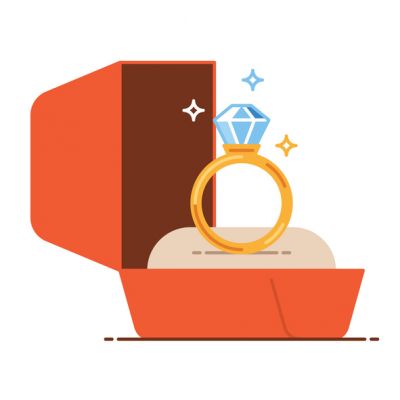 Many people wooing their beloved practice the common nuptial tradition of giving an engagement ring. This modern practice has undergone many transformations from its original ancient origins. As some couples take a hard look at marriage customs and decide which ones to adopt, discovering the unique history behind engagement rings may yield a few unexpected surprises.
Many people wooing their beloved practice the common nuptial tradition of giving an engagement ring. This modern practice has undergone many transformations from its original ancient origins. As some couples take a hard look at marriage customs and decide which ones to adopt, discovering the unique history behind engagement rings may yield a few unexpected surprises.
Beginnings in Ancient Rome?
While some historians point to possible evidence that engagement rings existed in ancient Egypt and Greece, the earliest solidly documentable evidence of their usage comes from ancient Rome. Author Karen K. Hersch in her book “The Roman Wedding: Ritual and Meaning in Antiquity” revealed that wealthy Romans would hold engagement parties for their daughters and sons, and that prospective grooms would give their future wives a ring to symbolize the betrothal. By the second century B.C., a bride-to-be was usually given two rings by her future husband: an iron one to wear at home, and a gold band to display in public.
Diamond Rings in the Middle Ages and Renaissance Periods
Believe it or not, diamond-studded engagement bands were not a common practice until the early twentieth century. However, they became fashionable among royalty and wealthy nobles in Renaissance Europe. One of the first documented instances of their use is in the betrothal of Archduke Maximilian of Austria to Mary of Burgundy in 1477.
Diamonds were not a typical inclusion in most jewelry pieces during the Middle Ages. Author Rayner W. Hesse disclosed two potential reasons for this in his 2007 book “Jewelrymaking Through History: An Encyclopedia.” Part of the blame lies on the Catholic Church’s condemnation of using cut gems in jewelry in medieval times, citing their use in amulets as the reason for their disapproval. Moreover, trade restrictions imposed by Arabic kingdoms during the period limited the supply of gems into Europe until the 1300s. Meanwhile, would-be grooms among the common people continued giving their sweethearts simple metal bands. The engagement ring almost faded from practice during the Protestant Reformation, as more men opted to simply present their loved ones with a wedding ring at their marriages.
Clever Marketing Makes Diamond Engagement Rings Popular
Those looking for a source for the contemporary practice of giving diamond engagement rings need to look only at international gem giant De Beers. A 2014 BBC article revealed that De Beers embarked on a massive marketing campaign in the late 1930s, seeking to recover from significantly reduced sales worldwide. The original campaign aimed to convince young men to purchase diamond-studded engagement rings valued at two to three times their monthly salaries. It proved to be wildly successful, with sales skyrocketing even in the United Kingdom and Japan.
Millennials Now Eschew Buying Diamonds
Many headlines decry the lifestyle habits of the Millennial generation, blaming them for everything from “hookup culture” to decreased sales in the diamond industry. However, a converging collection of economic and social conditions may be responsible. A 2016 Huffington Post article discussed the crushing loads of debt faced by many, usually from efforts to fund their educations. In addition, some Millennials find their incomes barely adequate for daily living, which puts luxury items like diamond rings far out of reach. Finally, concerns exist over the inability to separate “conflict-free” gemstones from “blood diamonds,” or those mined to finance war efforts in several parts of Africa.
Choosing Your Traditions
If you’re fretting over how to symbolically show your engagement to the world, take heart. As all human traditions have origins for their creations, knowing the meanings and history behind them are essential to making informed choices about your own weddings. Knowing your partner’s wishes and choosing customs that make sense to both of you are the part of an ideal path to help forge your lives together.
Add Your Comment